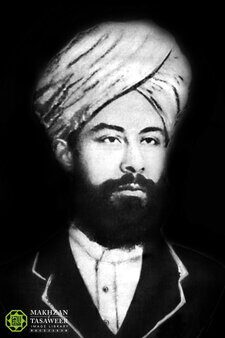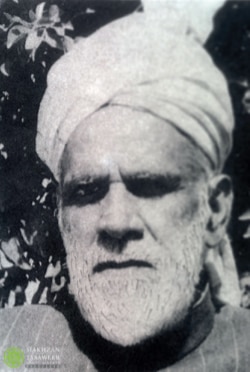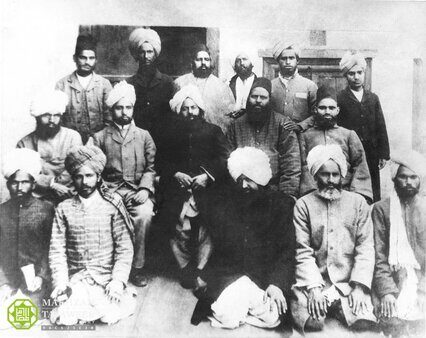7 January 1910: Hazrat Mir Qasim Alira, a companion of the Promised Messiahas, launched his paper Al Haq from Delhi. This paper started rendering services from Qadian under the new title of Al Farooq by 1915.
The name of the newspaper, Al Haq, was suggested by Hazrat Khalifatul Masih Ira. The newspaper soon gained a special reputation for its articles and content. In 1911, when the British government demanded from Al Haq a cash guarantee of 1000 rupees under the Press Act, other Muslim newspapers raised their voices against this decision.
Hazrat Mir Qasim Alira arranged and deposited 1000 rupees within three days. Later, in 1913, due to a serious financial crisis, the newspaper faced difficulty and was almost discontinued. On this, a message from Hazrat Khalifatul Masih Ira was received through Hazrat Sahibzada Mirza Bashiruddin Mahmud Ahmadra that the publication of Al Haq should not be ceased and that Huzoorra would provide some help in this matter. Hazrat Sahibzada Mirza Bashiruddin Mahmud Ahmadra personally provided financial aid for this newspaper. Thus, the printing of Al Haq continued and the services of Hazrat Mir Qasim Alira are remembered to this day. (Tarikh-e-Ahmadiyyat, Vol. 3, p. 313)

7 January 1938: Hazrat Musleh-e-Maudra delivered a Friday Sermon from Masjid Aqsa in Qadian, which was relayed through loudspeakers for the first time. On this occasion, Huzoorra also predicted that a day would come when a dars of the Holy Quran and hadith would be delivered from Qadian and simultaneously listened to across the world. The loudspeaker that was used on this date was donated by a devout member of the Jamaat from the North-West Frontier (NWF) region of the Indian subcontinent, Khan Muhammad Khan Sahib.
It was this very sermon that Huzoorra stated that although the Jamaat’s circumstances did not permit, seeing the speed at which Allah was spreading and causing the Jamaat to flourish, with the grace of Allah the Almighty, the day was not far that the a dars of the Holy Quran and hadith would be delivered in Qadian and the people of Java, and America, and England, and France, and Germany, and Austria, and Hungary, and Arabia, and Egypt, and Iran – people from all over the world – would listen to the dars in their location. What a wonderful sight that would be, Huzoorra said. (Tarikh-e-Ahmadiyyat, Vol. 7, p. 539)
7 January 1977: Hazrat Malik Ghulam Faridra MA, a companion of the Promised Messiahas, passed away in Lahore. He was born in 1896 in Gujrat to Hazrat Malik Nuruddinra. In 1908, he was blessed to visit the Promised Messiahas and, in 1909, he started his education in Qadian and entered Madrasa-e-Ahmadiyya. After he passed his matriculation exams, he entered Islamia College Lahore. When Ahmadi students from different colleges formed the Ahmadiyya Inter-College Association, he became its first president.
Hazrat Malik Ghulam Faridra dedicated his life to the Jamaat in 1916 and came to Qadian after completing his master’s in English. Sir Mian Fazl-i-Hussain Sahib (who was a member of the Education Council of the Viceroy of India) sent someone to Hazrat Musleh-e-Maudra to invite Hazrat Malik Ghulam Faridra to government service. Huzoorra replied, “Malik Sahib works for me. You may take [so and so].”
In November 1923, Hazrat Musleh-e-Maudra sent him to Germany as a missionary. Later, he was posted to England where he contributed towards the inauguration of the Fazl Mosque in London. He was fortunate and blessed to have the opportunity to call the first azan in Fazl Mosque. In July 1928, he returned to Qadian and became the editor of the fortnightly English newspaper, Sunrise. This newspaper began publishing weekly in 1930 and its office moved to Lahore in March 1932. Hazrat Malik Sahib also served as the editor of The Review of Religions. In 1939, he was able to serve as the manager of Nusrat School, Qadian.
One of his greatest services is the English translation of the Holy Quran and producing the short commentary of the Holy Quran in English.

8 January 1937: Hazrat Musleh-e-Maudra predicted the looming Second World War during his Friday Sermon and stressed the need for fervent prayers. It should be noted that these were warnings from almost two years before the outbreak of World War II in which Huzoorra explained the intensity of the then situation the world was in. (Khutbaat-e-Mahmud, Vol. 18, p.6)
8 January 1969: Hazrat Hafiz Mukhtar Ahmadra of Jahanpur, a companion of the Promised Messiahas, passed away.
He testified to the truthfulness of the Promised Messiahas when he read the commentary of the verse, وَوَجَدَكَ ضَالًّا فَهَدٰي in Huzoor’sas book, Aina-e-Kamalat-e-Islam.
On one occasion, Hazrat Musleh-e-Maudra mentioned Hazrat Hafiz Mukhtar Ahmadra and his father Hazrat Syed Alira and said:
“These two, father and son, are the backbone of Jamaat Ahmadiyya in UP [Uttar Pradesh].”
Hazrat Hafiz Mukhtar Ahmadra, after accepting Ahmadiyyat, dedicated his life for the service of religion. He had such a love for the books of Hazrat Ahmadas that, after having read them over and over again, he had memorised pages upon pages. His sharp memory was a special gift. Once, an opponent approached him and said that if Ahmadiyyat was the true Islam, he ought to memorise the Holy Quran and recite it to people in the following Ramadan. Thus, in the same year, he memorised the Holy Quran, and when Ramadan arrived, he recited it all in the Tarawih prayers.
Hazrat Hafiz Sahibra had a large library filled with thousands of rare books on theology and literature as well as some rare manuscripts of the Quran. He was a master at remembering references. He used to say that whenever he was asked about a particular reference, he would always be able to answer.
After the election of Hazrat Mirza Nasir Ahmad, Khalifatul Masih IIIrh, he had a strong desire to do bai‘at at Huzoor’srh hand, but he could not attend due to his frail health. Therefore, Huzoorrh himself visited his house and thus, he was able to do bai‘at at the hand of Hazrat Khalifatul Masih IIIrh .
Upon his demise, Huzoorrh mentioned his great services for Islam and said that his service to the Jamaat was unparalleled.

10 January 1962: Morarji Desai, Finance Minister of India, while on a visit to Batala, was offered literature of the Jamaat by an Ahmadi delegation. He would later become the fourth prime minister of India. (Tarikh-e-Ahmadiyyat, Vol. 21, p. 606)
10 January 1968: Due to Ramadan and Eid-ul-Fitr, which was in December 1967, the previous year’s Jalsa was not held. Thus, on this date, Jalsa Salana was held.
During the night between 10 and 11 January, bakers, who were hired to prepare rotis (Indian flat bread) for the Jalsa Langar went on strike. Huzoorrh appealed to every Ahmadi to eat only one roti. The total attendance was 100,000. Thus, even this roguish ploy could not hinder the programme of Jalsa Salana and all the programmes, by the grace of Allah, took place as planned. All Ahmadis set a great example of selflessness. (Tarikh-e-Ahmadiyyat, Vol. 24, p. 465)
11 January 1909: Hazrat Chaudhary Rustam Alira, a devout companion of the Promised Messiahas, passed away.
Hazrat Chaudhary Rustam Ali’sra association with the Promised Messiahas was established in 1884 when he purchased Barahin-e-Ahmadiyya while he was employed as a police sergeant in Jalandhar district, India. He migrated to Qadian after retiring from his job. His love and relationship with Hazrat Ahmadas is known from his letters which are preserved in Maktubat-e-Ahmad.

12 January 1913: Hazrat Sahibzada Mirza Bashiruddin Mahmud Ahmadra returned to Qadian after performing Hajj. Hazrat Khalifatul Masih Ira travelled a relatively long distance to welcome home the young Sahibzada Mirza Bashiruddin Mahmud Ahmadra.
(For further details, see Al Hakam, Issue 153, pp. 30-32.)
12 January 1929: Hazrat Baba Hidayatullahra, a companion of the Promised Messiahas well-known for his Punjabi poetry, passed away. He was born in 1832 and pledged allegiance around the year 1900. In addition to his poetry, he also wrote poems in support of the Promised Messiahas. He was a resident of Lahore. Once, the Promised Messiahas came to visit him in his house. (Lahore Tarikh-e-Ahmadiyyat, p. 280)
13 January 1954: Hazrat Musleh-e-Maudra went to Lahore where a court of inquiry was established to look into the Punjab Disturbances, which were caused by agitations against the Jamaat. On this date, Huzoor’sra statement started being recorded, which was completed by 15 January.
This statement was transcribed by the court in English, while its Urdu text of non-Ahmadi dignitaries can be read in Tarikh-e-Ahmadiyyat, volume 15 (pp. 371-413).

